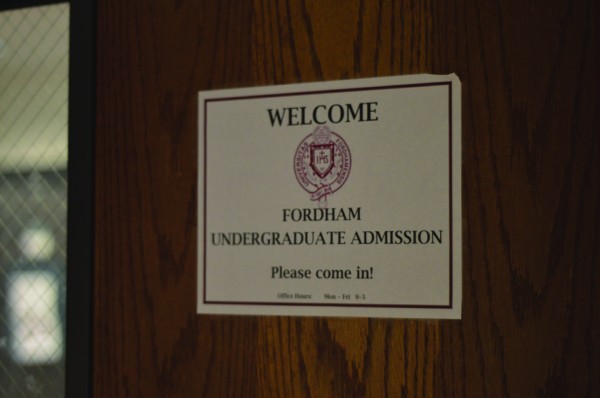College Admissions: A Numbers Game
The Office of Undergraduate Admissions uses a holistic approach when reviewing prospective students’ applications. (OBSERVER ARCHIVES)
April 18, 2013

This time last year, I was juggling about nine fat acceptance envelopes, frantically trying to decide which college would be the one I would spend the next four years of my life. Weighing the pros and cons was painful. But after seeing “Admission” starring Tina Fey and Paul Rudd I was left wondering how colleges reallydecide who gets the big envelope, and who gets the small one.
“Admission” is based on Jean Hanff Korelitz’s book of the same name that describes what happens behind closed doors when colleges are deciding on next year’s class. It may be a movie (and a comedy at that), but its depiction of the admissions process being highly superficial isn’t made of thin air. Admissions counselors’ practices are wrongfully putting people behind the numbers that mark them. Universities need to consider the person just as much as they consider their rankings. Scores and grades can help to ensure a high performing class—but not much else. For a well-rounded, diverse class with each student bringing something new and different to the table, it is absolutely necessary to consider who is behind each application. Requiring interviews, short supplements, or even offering a ‘numbers blind’ admissions process can all aid colleges in putting a class together that is more than just a compilation of numbers.
Jeremiah, a character in “Admission,” is the perfect example of when numbers and qualification conflict with one another in the admissions process. A largely self-taught genius with a GPA below 2.0 but perfect AP scores and near perfect SATs (without any preparation), was (officially) denied from Princeton. Although he’s a clear diamond in the rough, the board room keeps coming back to the issue of his occasional Ds and Fs in high school—completely ignoring the other great things about the applicant.
College admissions are additionally increasingly centered on a different (and in terms of potential for successful academic performance, irrelevant) set of numbers: how much is in your (or your parents’) bank accounts. For many schools, the top goal of admissions directors is to recruit students who can pay list price—full tuition. Public universities are especially conscious of this, what with dwindling budgets and the rising costs of education. Private colleges and universities are not blind to this either. About 40 percent of New York University’s students are paying ticket price—that means no financial aid whatsoever (and at one of the nation’s most expensive schools).
It makes sense that schools would want to move further up in the rankings. In this competitive atmosphere with largely all graduating high school seniors applying to colleges, it is easy for admissions boards picky with their applicants, as some schools (like UC Berkeley) has doubled in recent years. But disturbingly, schools have confessed to fudging their numbers in order to get a higher ranking. George Washington University, for example, reported that 78 percent of their 2011 matriculates were in the top 10 percent of their class, while it was only 58 percent. If the stated mission of colleges is to educate the public, how can we justify denying deserving students a quality education in order to climb up a few rungs on the U.S. News and World Report? I would hope that colleges would be able to spot these kinds of students—ones who truly wanted to learn, showed the potential for it, but maybe didn’t perform as well in certain subjects in high school or don’t come from wealthy families that can afford to pay for college without assistance.
In my own case, I feel that Fordham is a good match for me—despite my inkling that the reason I got the big envelope was due chiefly to my grades and scores. Numbers do help predict whether or not a student will do well at a particular school: and they’ve definitely done that for me.
But there’s more to college than academics and grades. Our grades from high school don’t necessarily make or break us, and so they shouldn’t be given such priority.
I’ve found people and groups at Fordham that I love and enjoy spending time with, but there’s still those condescending “Oh, you went to public school?” sentiments that I’ve been privy to more than I’d care to share. In a way, it’s the students’ responsibility to choose a school that’s right for them, but there’s only so much we can find out through attending information sessions and preview days.
Was I accepted (or denied) from certain colleges because of my numbers? I did well in high school and was proud of my SAT score, but other than this, there was nothing truly extraordinary on my applications. I never interviewed and there’s no way a 500 word essay could have portrayed anything meaningful about me as a person to the admissions counselors. True, it seems logical that numbers constitute the bulk of what admissions counselors have to work with, but it’s disconcerting to imagine that your class is just an arrangement of test scores, grades and incomes. Students are more than that, and it’s time for colleges and universities to recognize that.










